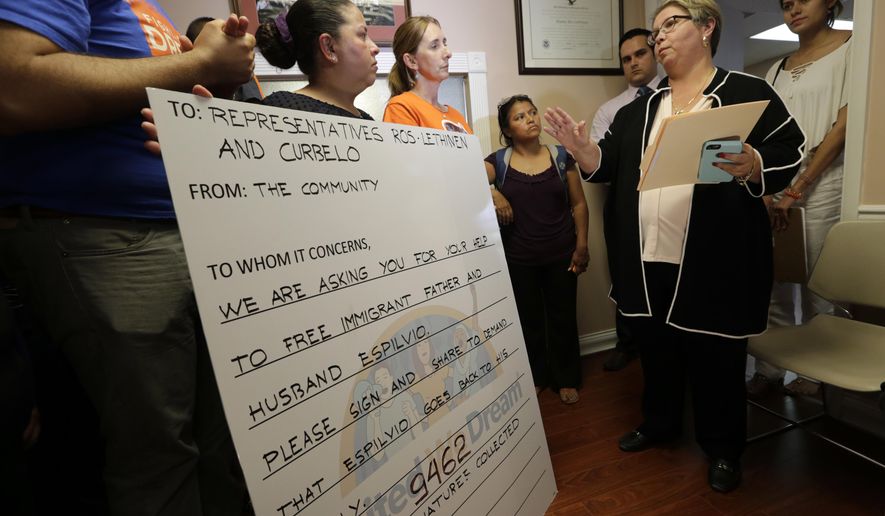The Trump administration said Monday that it will cancel a special immigration status that has protected thousands of Nicaraguans from deportation for nearly 20 years, but it punted on a decision for tens of thousands of people from Honduras, instead inviting Congress to step in and grant them full status.
The decision had been anxiously awaited by people from both of those countries, many of whom fear having to go back home after living in the U.S. for two decades under what is known as Temporary Protected Status, a humanitarian program that lets people from places that faced natural disasters remain in the U.S. while their home countries recover.
Some 5,000 people from Nicaragua and more than 86,000 Hondurans are still protected under status first granted in 1998, when Hurricane Mitch struck.
Acting Homeland Security Secretary Elaine Duke has concluded that Nicaragua has recovered sufficiently from the hurricane for people to have to return home, while Ms. Duke wants more information to evaluate Honduras.
Big decisions on Haiti and El Salvador are looming later this month and early next year, and those could affect more than 300,000 people, but officials said not to read anything into Ms. Duke’s decisions.
“The only indication you should receive is that the administration is examining earnestly and thoughtfully the conditions on the ground,” a senior administration official said in briefing reporters.
In the case of Nicaragua, the Department of Homeland Security said it will grant a one-year grace period for the protected immigrants to get their affairs in order, but they will have to either depart or find some other legal status in the U.S. by Jan. 5, 2019.
For Honduras, Ms. Duke’s inability to make a decision automatically kicks in a six-month extension, which protects citizens until July 5, 2018.
The senior administration official briefing reporters said the Trump administration wants Congress to consider a more permanent solution that would allow those protected to remain in the U.S.
“The administration would support Congress’ efforts to find such a solution,” the official said.
The law governing Temporary Protected Status is designed to give countries a chance to recover from disasters or other mass tragedies such as wars. It protects those who were in the U.S. as illegal immigrants, here on legal student visas or other temporary permits, letting them stay so their return doesn’t overwhelm their homelands.
TPS status was used to help West African nations deal with Ebola, while the Haiti and El Salvador declarations stem from devastating earthquakes — Haiti’s in 2010, and El Salvador’s dating back to 2001.
Some 263,000 people from El Salvador are protected by TPS, as are about 59,000 Haitians. Those countries are the two biggest designations.
Under previous administrations, TPS designations were regularly extended as a near-automatic decision. The Trump administration has taken a different approach, pointing out that the law allows TPS to exist only as long as the conditions caused by the original tragedy persist.
In the case of Haiti, Trump administration officials say, once the country recovers from the earthquake, people must go back — regardless of the fact that the country is struggling from non-hurricane issues.
Immigrant rights activists insist the countries remain stricken and say those who have been in the U.S. that long have put down roots that must be honored.
“Deporting TPS holders means deporting the parents of American citizens, separating families, and sending people to danger,” said the Rev. John L. McCullough, president of Church World Service, a leading refugee advocacy group.
Government officials in Honduras, El Salvador and Haiti have begged for the U.S. to renew TPS status and let their people stay, saying they have become a part of American society.
But the foreign countries’ motives in wanting their people to remain abroad are also a matter of dollars and cents.
Nearly 18 percent of Honduras’ economy consists of remittances — money sent back home to the country by Hondurans living elsewhere. Remittances to El Salvador constitute 17 percent of its economy, while in Haiti, it’s nearly 30 percent.
Nicaragua’s remittance rate is less than 10 percent. It was the only country of the for big ones with looming decisions whose government didn’t ask for renewed TPS.
All told, more than 435,000 people are in the U.S. under TPS. They are granted work permits, meaning they compete for jobs and are entitled to some taxpayer benefits.
When combined with illegal immigrant “Dreamers” protected by the Obama-era Deferred Action for Childhood Arrivals deportation amnesty, they represent well more than 1 million illegal immigrants who are authorized to be part of the U.S. workforce.
Congress is working on a solution for permanent status for Dreamers, and the Trump administration, in its announcement Monday, said TPS-protected migrants should also be part of a conversation.
• Stephen Dinan can be reached at sdinan@washingtontimes.com.




Please read our comment policy before commenting.